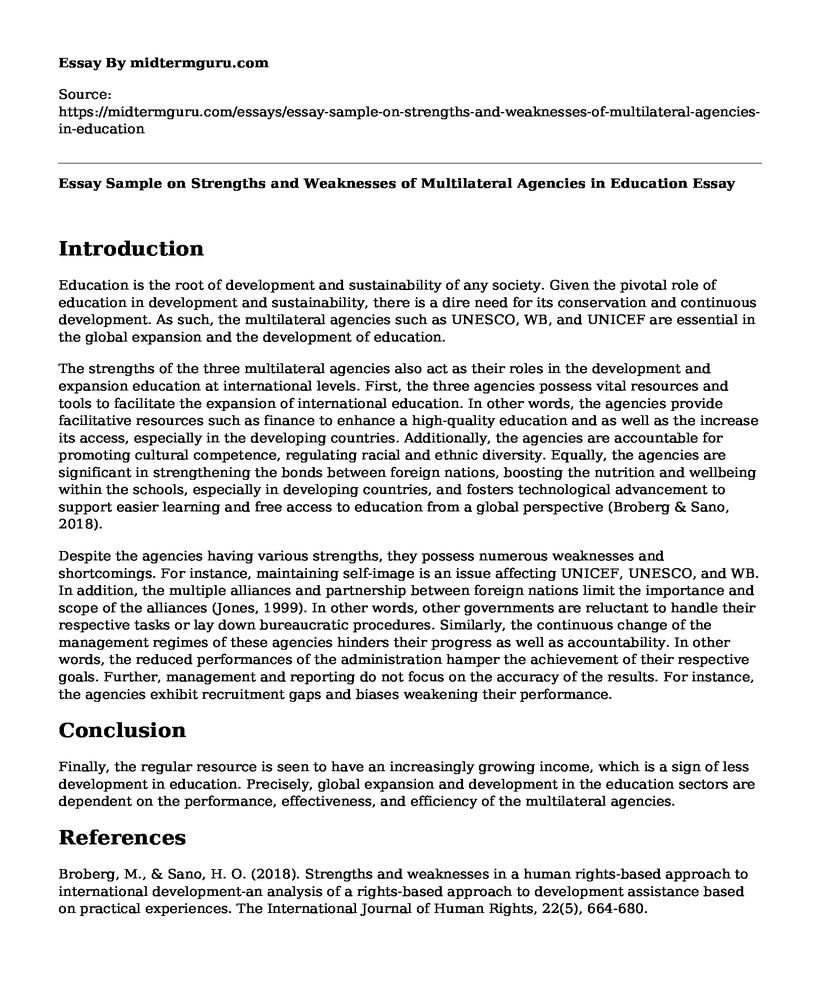Introduction
Education is the root of development and sustainability of any society. Given the pivotal role of education in development and sustainability, there is a dire need for its conservation and continuous development. As such, the multilateral agencies such as UNESCO, WB, and UNICEF are essential in the global expansion and the development of education.
The strengths of the three multilateral agencies also act as their roles in the development and expansion education at international levels. First, the three agencies possess vital resources and tools to facilitate the expansion of international education. In other words, the agencies provide facilitative resources such as finance to enhance a high-quality education and as well as the increase its access, especially in the developing countries. Additionally, the agencies are accountable for promoting cultural competence, regulating racial and ethnic diversity. Equally, the agencies are significant in strengthening the bonds between foreign nations, boosting the nutrition and wellbeing within the schools, especially in developing countries, and fosters technological advancement to support easier learning and free access to education from a global perspective (Broberg & Sano, 2018).
Despite the agencies having various strengths, they possess numerous weaknesses and shortcomings. For instance, maintaining self-image is an issue affecting UNICEF, UNESCO, and WB. In addition, the multiple alliances and partnership between foreign nations limit the importance and scope of the alliances (Jones, 1999). In other words, other governments are reluctant to handle their respective tasks or lay down bureaucratic procedures. Similarly, the continuous change of the management regimes of these agencies hinders their progress as well as accountability. In other words, the reduced performances of the administration hamper the achievement of their respective goals. Further, management and reporting do not focus on the accuracy of the results. For instance, the agencies exhibit recruitment gaps and biases weakening their performance.
Conclusion
Finally, the regular resource is seen to have an increasingly growing income, which is a sign of less development in education. Precisely, global expansion and development in the education sectors are dependent on the performance, effectiveness, and efficiency of the multilateral agencies.
References
Broberg, M., & Sano, H. O. (2018). Strengths and weaknesses in a human rights-based approach to international development-an analysis of a rights-based approach to development assistance based on practical experiences. The International Journal of Human Rights, 22(5), 664-680.
Jones, P. W. (1999). Globalisation and the UNESCO mandate: multilateral prospects for educational development. International Journal of Educational Development, 19(1), 17-25. doi:10.1016/s0738-0593(98)00056-x
Cite this page
Essay Sample on Strengths and Weaknesses of Multilateral Agencies in Education. (2022, Oct 26). Retrieved from https://midtermguru.com/essays/essay-sample-on-strengths-and-weaknesses-of-multilateral-agencies-in-education
If you are the original author of this essay and no longer wish to have it published on the midtermguru.com website, please click below to request its removal:
- Essay on Cause and Effect of How the Internet Influences Young Children
- Article Review: Standardized Tests Effectively Measures Student Achievement
- Essay Sample on Today's Exhausted Superkids
- Guidelines for Selecting Toys - Essay Sample
- Article Analysis Essay on 'As normal as possible'
- Teachers: Inspiring Creativity & Right Choices for a Better Future - Essay Sample
- Ultra City School District: Auditing Report & Expenses - Essay Sample







